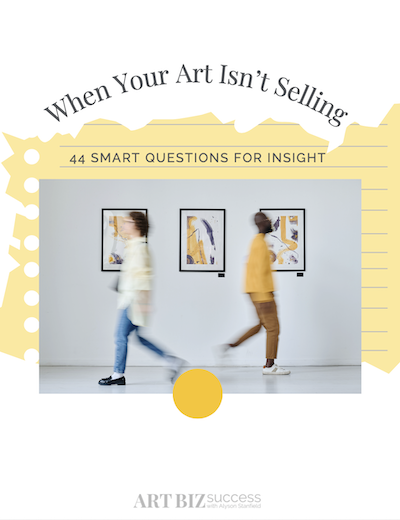You have a chance to guide a conversation about your art if you (1) don’t get defensive (2) recognize that almost all viewers’ questions are valid and sincere (3) learn how to ask thoughtful questions and (4) listen to the responses and engage on a deeper level with viewers.
 |
| Patrick Gracewood, Bear Fountain. Bronze, 12 x 11.5 x 9.75 inches. ©The Artist |
I recently asked artists to respond to this question. What do you say when someone asks: How long did it take you to make that?
One of the things I found interesting was that many of the 69 respondents automatically assumed this was a value question–that it was being asked because the viewer associated time invested with the price on the artwork. I think this is a dangerous assumption; although, of course, sometimes it is easy to reach this conclusion based on the tone in the person’s voice. I still think you can turn the conversation around to your advantage.
The important thing is that you don’t turn into a smart aleck. You’re trying to sell art here! You’ve placed your art to be seen by all who pass by it. The viewer’s (or, more to the point, potential customer’s) questions are valid–even if you don’t like them.
Barney Davey was spot on when he started his reply to my question with, “I’m glad you asked.” “Thank you for asking” would be another way of beginning your response. Being grateful for the opportunity to talk about your art puts you in a different frame of mind than building up your defenses.
In her comment, Rebecca Crowell was insightful when she responded, “Basically, I try to treat this question as a door that opens between myself and the other person.”
Ditto for Barbara Kemp Cowlin‘s thoughtful analysis: “The question of how long did it take you may be the only way a viewer can verbalize the broader questions.” Yes! Exactly!
After working with museum visitors for ten years and engaging them in dialogs about the art, I believe that people ask what we might consider silly questions because they don’t know how else to talk with an artist. Most of them are genuinely interested in the work. They were just never taught how to look at art, much less talk about it!
The question on my blog was a contest and I ultimately chose two winners, which you can read about here. The winning responses engaged the viewer in a dialogue by asking and responding to questions–not questions requiring a simple Yes or No response, but questions that actually made the viewer think. These types of questions help to educate art viewers and, because they build knowledge and an increased level of comfort, go a long way to turning art viewers into art buyers.
KNOW THIS———-~> Most people just want to know more about the art.
THINK ABOUT THIS—~> Do you find yourself getting defensive when you are asked questions about your art you don’t like?
DO THIS————~>Turn the conversation around! Start your response with “Thank You” and don’t utter a definitive statement that will kill the dialog. Asking questions back at your viewer shows that you care about what they think. Everyone likes to be heard and taken seriously.
Share your thoughts and listen to the podcast on the Art Biz Blog.
GET MORE FROM YOUR ONLINE PROMOTIONS at this LIVE Workshop MAY 2-3, 2009
Early registration ends April 1! Create a plan for promoting your art on the Internet while you’re surrounded by the beauty of the Rocky Mountains. Blogs, social networking, email newsletters and blasts. Whatever your focus, we’ll take care of you during this weekend workshop. Get the details.


